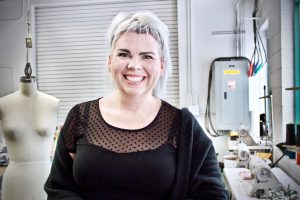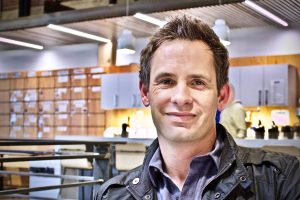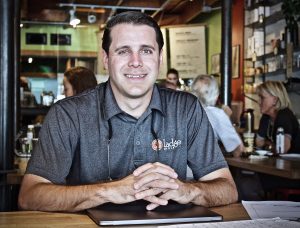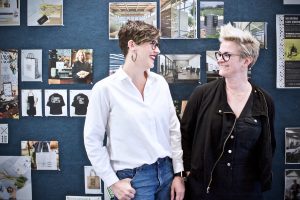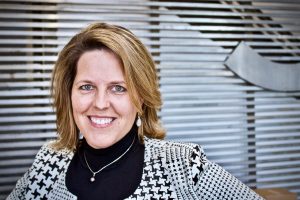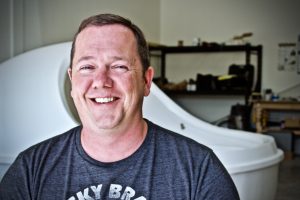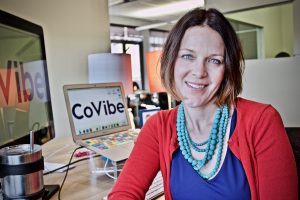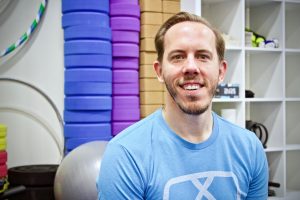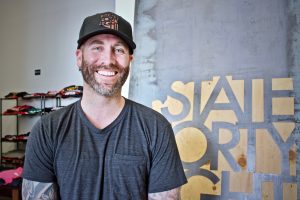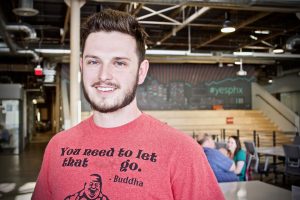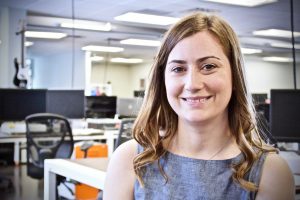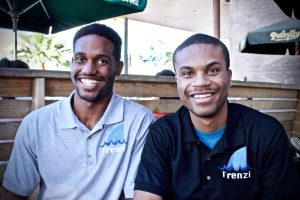- Slug: BC-CNS-Entrepreneurs, 4,100 words.
- Photos and captions below.
By SKYLER SNIDER
Cronkite News
The 2017 Kauffman Index of Growth Entrepreneurship report found that young companies create an average of 3 million new jobs every year and have been responsible for almost all new net job creation in the United States over the past 40 years. And although such areas as Silicon Valley, New York City and Boston are generally regarded as entrepreneurial hubs for their high rate of venture investment, other cities across the country are showing significant entrepreneurial growth – and Phoenix is one of them.
According to a 2018 study conducted by Fit Small Business, the Phoenix area is one of the top 15 most entrepreneurial areas in the United States, producing 380 new business owners out of 100,000 adults each month.
Metro Phoenix made the list for its growth in the following categories: startup density; rate of new entrepreneurs; opportunity share of new entrepreneurs; venture capital; investment in the city; tax friendliness to small businesses; business as the primary source of income for local entrepreneurs; infrastructure and pollution; annual payroll number of firms with paid employees; and number of of nonemployer firms.
Below, our photo series highlights more than 20 metro Phoenix entrepreneurs – their triumphs and challenges, and why basing their businesses and careers in Phoenix helps them thrive.
General Manager, Galvanize Phoenix
Phoenix is a very business-friendly climate, a very business-friendly political climate and a very cooperative business community. This Valley has a way of helping and supporting new businesses that come here. Plus, the cost structure here is more reasonable than that of the East or West Coast. And while there are certainly a lot of companies that have hubs in cities like San Francisco or New York, it’s just too cost restrictive for people to move or expand there. That’s why Phoenix has become such an attractive market for entrepreneurs to go to.
TOM SPENGLER
Entrepreneurial and Technology Mentor, Galvanize Phoenix
“Becoming a mentor gave me the opportunity to help other companies and get exposure to what other startups are doing. Phoenix was a great place to come and get plugged in, because I personally really enjoy helping entrepreneurs. As someone who went through the whole grind and made my fair share of mistakes and successes, it’s great to see this group of people and be able to help them … I’ve found that a lot of people want to start businesses, but a lot of the time, they don’t feel that they’re in an environment with enough of a support mechanism to help them. That’s why coworking spaces like Galvanize matter, because you’re around other people that have the same goals in mind.”
LESLIE PICO
Community Manager, Propy
“When it comes to starting a business, Phoenix is the ideal place to be. Aside from Phoenix being a friendly and easy place for businesses to transition to, I think that people are starting to realize that this city is one of the biggest exporters of talent. For me, Arizona was this friendly sandbox where I could come and launch blockchain initiatives, but it’s also a place where I can help to engage individuals that are still in their undergrad, or even grad school. I’m a big proponent of helping them build professional networks, so that when they reach that point, where they’re starting to look for positions, they have no reason to leave because they’ve already built a strong network. This Valley has a way of helping and supporting new businesses and people that come here. The opportunities are endless and it’s just growing like crazy. I definitely see myself being in this community for a long time.”
ANGELA JOHNSON
C0-Founder, FABRIC
“I was watching all of these talented designers fail, and all of these fashion students leave because they didn’t have the resources that they needed in the city to be successful, because there really wasn’t any type of fashion community that existed here. So once I saw that this was such a big problem, I wanted to push myself to find a way to rally everyone together, find a way so that we could all share a manufacturing space and a fashion community could finally start to sustain itself in Arizona… From more designers coming here to fashion majors being added to schools like ASU, the once non-existent fashion industry is starting to grow here. And I think designers want to be here instead of saturated hubs like Los Angeles or New York. Their work can actually be noticed here. Anyone who is moving ‘fashion forward’ in Arizona is going to make news.”
NEEL MEHTA
Co-Founder, EpiFinder
“I’m a big believer that if you are in a place where you can see that both the city and the community are growing, it’s a good place to be,” said Neel Mehta, co-founder of EpiFinder, a company that has developed a clinical decision support software that helps specialty medical doctors and neurologists diagnose epilepsy at the point-of-care. When asked why he thinks more people are coming to Phoenix instead of places like Silicon Valley, Mehta spotted three trends: 1) that Phoenix has a more affordable cost of living than other cities, 2) ASU, UA and GCU are providing a big pool for employers to source young talent from, and 3) that the close proximity of everything in the Valley increases productivity.
MELISSA ALEXANDER AND AMANDA HARPER
Founders, Canary Studio
“Before 2008, we had thought of making a sub-studio that would offer branding, graphic and interior design services, but Canary was truly born out of the opportunity that we saw when the recession hit,” said Melissa Alexander, right, a senior architect and co-founder of Canary, a creative studio that was grown out of Gould Evans’ Phoenix office. “We found that people wanted to overhaul their identity instead of having architects build large structures for them. When architects weren’t wanted during the recession, Canary flourished. Since then, both companies have grown and we’ve moved to the Warehouse District, which has become this entrepreneurial and startup hub. From WebPT to Galvanize, we’ve found that this area of Phoenix is the sought after place for so many entrepreneurs.”
Amanda Harper, left, added, “I think that there has been a revitalization within the city as a whole, because more and more companies are realizing the potential that Phoenix has. From an economic standpoint, this city is taking off. So to have the opportunity to be a part of that growth has been incredibly exciting and inspiring for us.”
SAKURA CONSIDINE
Co-Founder, Bloguettes
“My co-founder and I had thought about launching Bloguettes in outside cities like L.A. or New York, but we wanted to stay in Phoenix because of what it had to offer, and that was the fact that we were kind of this big fish in a small pond,” said Sakura Considine, co-founder of Bloguettes, a small creative agency that is just turned four years old. “Even to this day, there really isn’t a company in the valley that’s like us, we’re very female oriented. Being in Phoenix is what has allowed Bloguettes to grow. This community is so supportive, and on top of that, there isn’t a lot of competition between companies here. Each business does things differently and we all have our own unique strengths, so we’re always helping and supporting one another. And that’s just not something you can find in a lot of other cities.”
ANTHONY JANSSEN
Founder, Ladge Media
“In Phoenix, it’s hard to find people in the film industry that take it as seriously as I do. In a place like Hollywood, the ‘best of the best’ is the standard. But here, a challenge is that people are too content with mediocre work, and it’s a shame. We have some great public relations agencies in the Valley, but when it comes to finding creative talent, they often look to places like L.A. or New York instead of their own backyard. We need to set a higher bar. If we want to have a more creative community, then this city needs to demand it.”
RAMI KALLA
Founder, Point in Time Studios
“When you take a look at large markets, you can see that Phoenix is a much younger city. And I think that’s both a good and bad thing. For instance, one of our offices is in L.A. and clients there definitely have a higher expectation. They’re more savvy. Which is good, because it pushes content to be better, but it definitely makes things more challenging for people just starting. So on the flip side of that, Phoenix is great in the sense that its newness allows for businesses to have more of a trial and error process.”
RICKY JOHNSON AND BRANDON CAFFIE
Founders, Frenzi Mobile App
“When you’re starting a business, you need to meet with a diverse group of people,” said Ricky Johnson, left, Founder of Frenzi mobile app, which aims to reduce food waste. “I’ve found that ASU and Phoenix both provide such a diverse community. Understanding that there is a melting pot of people in this community is important. Understanding that these people are also your business’ audience is important.” Johnson’s business partner, Brandon Caffie, right, who Johnson met at their former ASU residence hall added, “I also think it’s important for businesses to have a core team. I explicitly remember the times I needed to motivate Ricky to keep going. Sometimes you have to have someone there to remind you why you started.”
JENNY POON
Founder, Co+Hoots
“The business world is typically run by your white, middle-class male, and oftentimes, there’s not a big presence of women or minorities in the business world. My goal is to expand opportunities to underrepresented communities. Because there’s already a lot of challenges that come with starting any business, let alone adding in the challenges that come with being a minority. There’s a lot of obstacles that these underrepresented groups face. But these people need access. They need to be included.”
MARISHA McGRORTY
Founder, SLP Now
“If I had any advice for someone starting a business, it’s to find your community,” said Marisha McGrorty, founder of SLP Now, a blog and mobile app that helps speech language pathologists manage their heavy workloads. “Being an entrepreneur is hard. It’s big and scary and unknown – it’s unlike any other job. So having people who are in the same place as you and even a little bit further, really makes all of the difference in the world when you’re first starting out.”
RON ROBERTSON
Founder, Picmonic
“The ecosystem of Phoenix has changed drastically, even in the last five to six years,” said Ron Robertson, founder of Picmonic, a platform that creates mnemonic study aids to help health care students with long-term memory so that they can improve test scores. “Take a look at new coworking spaces like Galvanize. What these spaces are doing is significant in bringing like-minded people together. There’s a certain energy that comes with having hundreds of entrepreneurs under one roof. And that’s energy, that motivation, is incredible.”
TANNER GERMAN
Founder, Davinci Digital
“If I had advice for any entrepreneur, it’d be that you never have to go it alone,” said Tanner German, founder of Davinci Digital, a graphic design company that German launched just six months ago. “I think there’s this inherent stigma with a lot of entrepreneurs in that there’s a little bit of an ego complex. I find that there’s too many people who think that they need to do everything by themselves and that asking for help is somehow a sign of weakness. That’s really, really not the case at all here, and that probably one of the best things about the Phoenix community. You can ask anyone for help and they won’t make judgements about you as an entrepreneur, they’re just willing to help.
MICHAEL SPANGENBERG
Co-Founder, State Forty Eight
“The biggest challenge of being an entrepreneur is patience,” said Michael Spangenberg, co-founder of State Forty Eight, a Chandler clothing line that’s entirely inspired by Arizona. “For the first two years, my co-founders and I were all working full-time jobs. It’s hard working day and night, working around your already set work schedule. But you have to keep going. You have to keep thinking ‘it’s coming, it’s coming’. You have to have patience, and you have to celebrate all of the small wins.”
PATRICK REIER
Founder, Acro Body
“You don’t always know who your clientele is going to be,” said Patrick Reier, founder of Acro Body, one of the first yoga studios in the country to specifically focus on the acro practice. “Oftentimes, I find that entrepreneurs think they’re going to attract a very specific type of client and that isn’t always the case. So if I had any advice to someone who wanted to start their own business here, it’d be to start small. Figure out who your client really is, see what their interests really are, and listen to their feedback. You have to listen in order to grow.”
KATE ROGERS
Founder, CoVibe
“A lot of founders are either subject matter experts or very technical people,” said Kate Rogers, founder of CoVibe, a business dedicated to supporting startups that launched just two months ago. “So it’s hard for them to understand people, it’s hard for them to understand how important of a role people play in a business, because it’s not always where their head is at. They’re focused on all of the things that they’re good at, which is certainly a fine thing to do, but a lot of founders and co-founders tend to make the mistake of ignoring all the things that they’re not good at, and that’s where a lot of problems lie. Founders need to come face-to-face with these challenges. They need to overcome them if they want to be successful.”
RYAN SIEKER
President, Float Pod Technologies
“Phoenix is growing, there’s not doubt about it,” said Ryan Sieker, president of Float Pod Technologies, which manufactures sense-deprivation tanks in Arizona. “But there is a challenge here. Because while there is talent here, the talent pool isn’t as strong as it is in bigger cosmopolitan areas like Chicago, L.A. or New York. But I do think that those places are getting so big and so competitive that Phoenix is going to start looking a lot more appealing. You’re going to see talent making the decision to come here instead.”
BRET GILES
Founder, Sitewire
“The business climate here in Phoenix is very conducive for small business owners and entrepreneurs,” said Bret Giles, founder of Sitewire, an advertising and marketing agency that launched in Tempe in 1999. “Quite frankly, there aren’t really any big companies here. Phoenix lacks the presence of any Fortune 500 companies. And naturally, a lot of the world is attracted to the allure of ginormous companies like Google, but since Phoenix doesn’t have ‘a Google’, small companies are far more respected here. Entrepreneurs and small businesses are a huge part of what makes up the city’s DNA.”
DIANA VOWELS
General Manager, Galvanize Phoenix
“Phoenix is a very business-friendly climate, a very business-friendly political climate and a very cooperative business community. This Valley has a way of helping and supporting new businesses that come here. Plus, the cost structure here is more reasonable than that of the East or West Coast… That’s why Phoenix has become such an attractive market for entrepreneurs to go to.”
TOM SPENGLER
Entrepreneurial and Technology Mentor, Galvanize Phoenix
“Becoming a mentor gave me the opportunity to help other companies and get exposure to what other startups are doing. Phoenix was a great place to come and get plugged in, because I personally really enjoy helping entrepreneurs. As someone who went through the whole grind and made my fair share of mistakes and successes, it’s great to see this group of people and be able to help them.”
LESLIE PICO
Community Manager, Propy Inc.
“When it comes to starting a business, Phoenix is the ideal place to be. Aside from Phoenix being a friendly and easy place for businesses to transition to, I think that people are starting to realize that this city is one of the biggest exporters of talent”.
ANGELA JOHNSON
C0-Founder, FABRIC
“I was watching all of these talented designers fail, and all of these fashion students leave because they didn’t have the resources that they needed in the city to be successful… From more designers coming here to fashion majors being added to schools like ASU, the once non-existent fashion industry is starting to grow here. And I think designers want to be here instead of saturated hubs like Los Angeles or New York. Their work can actually be noticed here.”
NEEL MEHTA
Co-Founder, EpiFinder
“I’m a big believer that if you are in a place where you can see that both the city and the community are growing, it’s a good place to be,” said Neel Mehta, co-founder of EpiFinder. When asked why he thinks more people are coming to Phoenix instead of places like Silicon Valley, Mehta spotted three trends: 1) that Phoenix has a more affordable cost of living than other cities, 2) ASU, UA and GCU are providing a big pool for employers to source young talent from, and 3) that the close proximity of everything in the Valley increases productivity.”
MELISSA ALEXANDER AND AMANDA HARPER
Founders, Canary Studio
“I think that there has been a revitalization within the city as a whole, because more and more companies are realizing the potential that Phoenix has. From an economic standpoint, this city is taking off. So to have the opportunity to be a part of that growth has been incredibly exciting and inspiring for us.” – Amanda Harper (right), Cofounder of Canary Studio.
SAKURA CONSIDINE
Co-Founder, Bloguettes
“My co-founder and I had thought about launching Bloguettes in outside cities like L.A. or New York, but we wanted to stay in Phoenix because of what it had to offer, and that was the fact that we were kind of this big fish in a small pond,” said Sakura Considine, co-founder of Bloguettes, a small creative agency that is just turned four years old. Being in Phoenix is what has allowed Bloguettes to grow.”
ANTHONY JANSSEN
Founder, Ladge Media
“In Phoenix, it’s hard to find people in the film industry that take it as seriously as I do. In a place like Hollywood, the ‘best of the best’ is the standard. But here, a challenge is that people are too content with mediocre work, and it’s a shame. We need to set a higher bar. If we want to have a more creative community, then this city needs to demand it.”
RAMI KALLA
Founder, Point in Time Studios
“When you take a look at large markets, you can see that Phoenix is a much younger city. And I think that’s both a good and bad thing. For instance, one of our offices is in L.A. and clients there definitely have a higher expectation. They’re more savvy. Which is good, because it pushes content to be better, but it definitely makes things more challenging for people just starting. So on the flip side of that, Phoenix is great in the sense that its newness allows for businesses to have more of a trial and error process.” – Rami Kalla, Founder, Point in Time Studios.
RICKY JOHNSON AND BRANDON CAFFIE
Founders, Frenzi Mobile App
“When you’re starting a business, you need to meet with a diverse group of people,” said Ricky Johnson, left, Founder of Frenzi mobile app, which aims to reduce food waste. “I’ve found that ASU and Phoenix both provide such a diverse community. Understanding that there is a melting pot of people in this community is important.” Johnson’s business partner, Brandon Caffie, right, who Johnson met at their former ASU dorm added, “I also think it’s important for businesses to have a core team… Sometimes you have to have someone there to remind you why you started.”
JENNY POON
Founder, Co+Hoots
“The business world is typically run by your white, middle-class male, and oftentimes, there’s not a big presence of women or minorities in the business world. My goal is to expand opportunities to underrepresented communities… Because there’s already a lot of challenges that come with starting any business, let alone adding in the challenges that come with being a minority. There’s a lot of obstacles that these underrepresented groups face. But these people need access. They need to be included.”
MARISHA McGRORTY
Founder, SLP Now
“If I had any advice for someone starting a business, it’s to find your community,” said Marisha McGrorty, founder of SLP Now, a blog and mobile app that helps speech language pathologists manage their heavy workloads. “Being an entrepreneur is hard. It’s big and scary and unknown- it’s unlike any other job. So having people who are in the same place as you and even a little bit further, really makes all of the difference in the world when you’re first starting out.”
RON ROBERTSON
Founder, Picmonic
“The ecosystem of Phoenix has changed drastically, even in the last five to six years,” said Ron Robertson, founder of Picmonic, a platform that creates mnemonic study aids to help health care students with long-term memory so that they can improve test scores. “Take a look at new coworking spaces like Galvanize. What these spaces are doing is significant in bringing like minded people together. There’s a certain energy that comes with having hundreds of entrepreneurs under one roof. And that’s energy, that motivation, is incredible.”
TANNER GERMAN
Founder, Davinci Digital
“If I had advice for any entrepreneur, it’d be that you never have to go it alone,” said Tanner German, founder of Davinci Digital, a graphic design company that German launched just six months ago. “I think there’s this inherent stigma with a lot of entrepreneurs in that there’s a little bit of an ego complex. I find that there’s too many people who think that they need to do everything by themselves and that asking for help is somehow a sign of weakness. That’s really, really not the case at all here.”
MICHAEL SPANGENBERG
Co-Founder, State Forty Eight
“The biggest challenge of being an entrepreneur is patience,” said Michael Spangenberg, co-founder of State Forty Eight, a Chandler-based clothing line that is entirely inspired by Arizona. “For the first two years, my co-founders and I were all working full-time jobs. It’s hard working day and night, working around your already set work schedule. But you have to keep going. You have to keep thinking ‘it’s coming, it’s coming’. You have to have patience, and you have to celebrate all of the small wins.”
PATRICK REIER
Founder, Acro Body
“You don’t always know who your clientele is going to be,” said Patrick Reier, founder of Acro Body, one of the first yoga studios in the country to specifically focus on the acro practice. “Oftentimes, I find that entrepreneurs think they’re going to attract a very specific type of client and that isn’t always the case. So if I had any advice to someone who wanted to start their own business here, it’d be to start small. Figure out who your client really is, see what their interests really are, and listen to their feedback. You have to listen in order to grow.”
KATE ROGERS
Founder, CoVibe
“A lot of founders are either subject matter experts or very technical people,” said Kate Rogers, founder of CoVibe, a business dedicated to supporting startups that launched just two months ago. “… A lot of founders and co-founders tend to make the mistake of ignoring all the things that they’re not good at, and that’s where a lot of problems lie. Founders need to come face-to-face with these challenges. They need to overcome them if they want to be successful.”
RYAN SIEKER
President, Float Pod Technologies
“Phoenix is growing, there’s not doubt about it,” said Ryan Sieker, president of Float Pod Technologies, a company that manufactures sense-deprivation tanks in Arizona. “But there is a challenge here. Because while there is talent here, the talent pool isn’t as strong as it is in bigger cosmopolitan areas like Chicago, L.A. or New York. But I do think that those places are getting so big and so competitive that Phoenix is going to start looking a lot more appealing. You’re going to see talent making the decision to come here instead.”
BRET GILES
Founder, Sitewire
“The business climate here in Phoenix is very conducive for small business owners and entrepreneurs,” said Bret Giles, founder of Sitewire, an advertising and marketing agency that launched in Tempe in 1999. “Quite frankly, there aren’t really any big companies here. Phoenix lacks the presence of any Fortune 500 companies. And naturally, a lot of the world is attracted to the allure of ginormous companies like Google, but since Phoenix doesn’t have ‘a Google’, small companies are far more respected here. Entrepreneurs and small businesses are a huge part of what makes up the city’s DNA.”
For more stories from Cronkite News, visit cronkitenews.azpbs.org.
^_=

